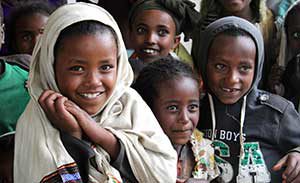 More needs to be done to address skin diseases in developing countries.
More needs to be done to address skin diseases in developing countries.
Skin diseases in developing countries have a serious impact on people’s quality of life, causing lost productivity at work and school, and discrimination due to disfigurement. Skin changes may also indicate the presence of more serious diseases that need treatment.
In the past, such conditions were ignored or given low priority by health authorities because they did not, on the whole, kill people, and they often did not present in tertiary care centres.
But now there is a big push at both national and international levels to train health workers in developing countries to improve diagnosis and treatment of dermatological conditions.
Professor Rod Hay, Head of the School of Medicine and Dentistry, Queen’s University Belfast, said the change is very welcome. Hay is Chair of the International Foundation for Dermatology, a non-profit organization based in Chicago, the United States, linked to the International League of Dermatological Societies, that aims to improve dermatological care in developing countries. He said: “There is better recognition of the extent of the problem, helped by the fact that the first signs of certain diseases, including HIV/AIDS, leprosy and onchocerciasis, tend to appear as skin problems.”
